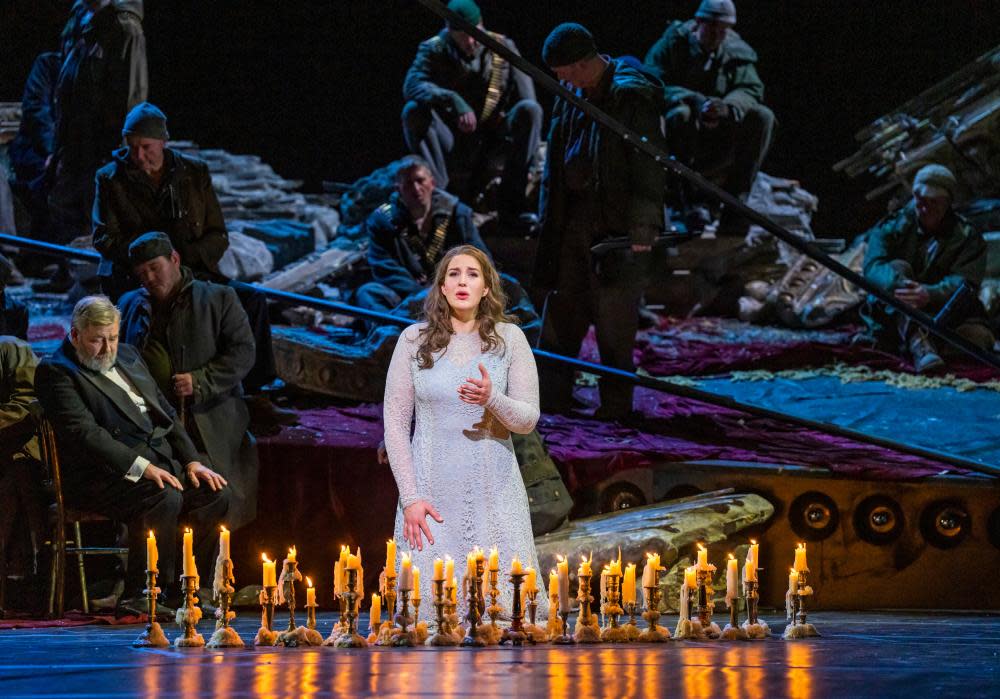The week in classical: Tannhäuser; Isata Kanneh-Mason & Maxwell Quartet; Gesualdo Six: Secret Byrd

An orgy with the main stud out of action is – I’m guessing here – the ultimate frustration. Luckily, Wagner’s Tannhäuser, which launches with a prolonged bacchanalian frenzy, is merely theatre, as the Royal Opera House production, directed by Tim Albery and new in 2010, emphatically reminds us. Centre stage is a proscenium arch, a replica of the ROH’s gold-and-crimson own. Art and life clash head on: literally here. Hhours before the opening of this second revival, an unwell Stefan Vinke pulled out of singing the title role.
Nobly he walked the part, which fortunately includes a good deal of sitting down, with the Austrian tenor Norbert Ernst singing from the side. Uneven dramatically, much tinkered with by Wagner himself, Tannhäuser relies on the quality of its singers to yank it out of the putrid bog of desire, or the swamp of religiosity. We must thank Ernst for enabling the performance, conducted by Sebastian Weigle, to go ahead.
He has sung the role in Wuppertal, but his best endeavours could not produce the heroic vocal thrill needed. You may ask, why no understudy, but having a Covent Garden-standard stand-in for a role few people in the world can sing is unworkable. (Try asking Djokovic to hang around in case Nadal has hamstring issues.) That said, the effect of a voice coming from one place and a person lip-syncing like a goldfish from another can create unwonted comedy.
We still had a good debauch, choreographed by Jasmin Vardimon: a mesmerising, acrobatic bender, fearlessly performed on, off and around a long table by 12 dancers. Venus (Ekaterina Gubanova), as a nightclub hostess in sparkling Lurex, held sway, but this underdeveloped role never quite delivers. There was much to relish nonetheless. The Royal Opera chorus (director William Spaulding), as shriven pilgrims or people of the Wartburg, sang with impeccable ensemble and rich tonal variety, often hushed to near inaudibility. The orchestra too, one nervous string flurry aside, was impressive, constantly alert and attentive to the Italianate scoring of this early Wagner. (The “Paris production” of 1861, used here, incorporates music written nearly two decades earlier.)
Two top-name singers gave performances to cherish. The Norwegian soprano Lise Davidsen, as Elisabeth, showed majestic vocal power, as well as subtle intelligence, adding complexity to this “good woman spurned” role. Davidsen has blossomed since her remarkable first appearance on the operatic scene just eight years ago (after winning Plácido Domingo’s Operalia and Queen Sonja competitions in 2015). She deserved every decibel of her noisy applause.
As Wolfram, the Canadian bass-baritone Gerald Finley brought out the pain and humanity of this blameless knight, who fights to save his friend at the cost of his own happiness. His ode to the evening star (O du, mein holder Abendstern) is the opera’s still point, beautifully delivered by the ever eloquent Finley. Mika Kares’s mighty Landgrave, Sarah Dufresne’s Young Shepherd and Egor Zhuravskii’s Walther all stood out. This is a lugubrious production, a gloomy, war-torn landscape in Michael Levine’s designs, but still worth making an effort to see – especially in its complete state, with Vinke back in the title role. A bonus is the presence, at the finale, of the Tiffin Boy’s Choir just as the pope’s staff sprouts green leaves. Don’t ask. This is Wagner.
Slowly the classical world is rebuilding itself after Covid, with cautious overhauling and realignment, whether intentional or forced by economics. Changes of leadership or music director are afoot in Birmingham, Bournemouth and Manchester. Radio 3, partly relocating to Salford, has announced a new controller, Sam Jackson. Two major London venues, the Barbican and the Southbank, have had multiple comings and goings. For now, we welcome the first season at the Southbank fully programmed by Toks Dada, head of classical music.
An early start, and an audience of all ages, gave pianist Isata Kanneh-Mason’s concert with the Maxwell Quartet a mood of freshness, helped by unusual repertoire. The best known work was Felix Mendelssohn’s Piano Trio No 2 in C minor (1845), a prelude to two quintets: Eleanor Alberga’s Clouds for piano quintet (1984), written as a dance score and full of quirky rhythmic games and bewitching, nebulous textures; and Ernő Dohnányi’s Piano Quintet No 1 in C minor, Op 1 (1895), a student work, restless and irresistibly buoyant, with notably lovely solos for viola and cello. Kanneh-Mason was at the heart of the music-making, a poised, unshowy chamber musician at one with her fellow performers – a winning combination of her youth and the quartet’s experience.
It is too early in the year to accuse anyone of not having noticed William Byrd’s 400th anniversary. This English Catholic composer, effectively in exile in his own Protestant land, steered a treacherous route between suppressing and practising his religion. Secret Byrd, “an immersive staged mass”, took place in the candlelit crypt of St Martin-in-the-Fields. Owain Park directed the Gesualdo Six in Byrd’s Mass for Five Voices, with viol music by Fretwork: elite early music ensembles both, performing with effortless perfection. You could walk around in the near darkness and follow the action. Or you could sit, listen and imagine.
Star ratings (out of five)
Tannhäuser ★★★
Isata Kanneh-Mason & Maxwell Quartet ★★★★
Secret Byrd ★★★★★
Tannhäuser is at the Royal Opera House, London, until 16 February

 Yahoo Movies
Yahoo Movies 
